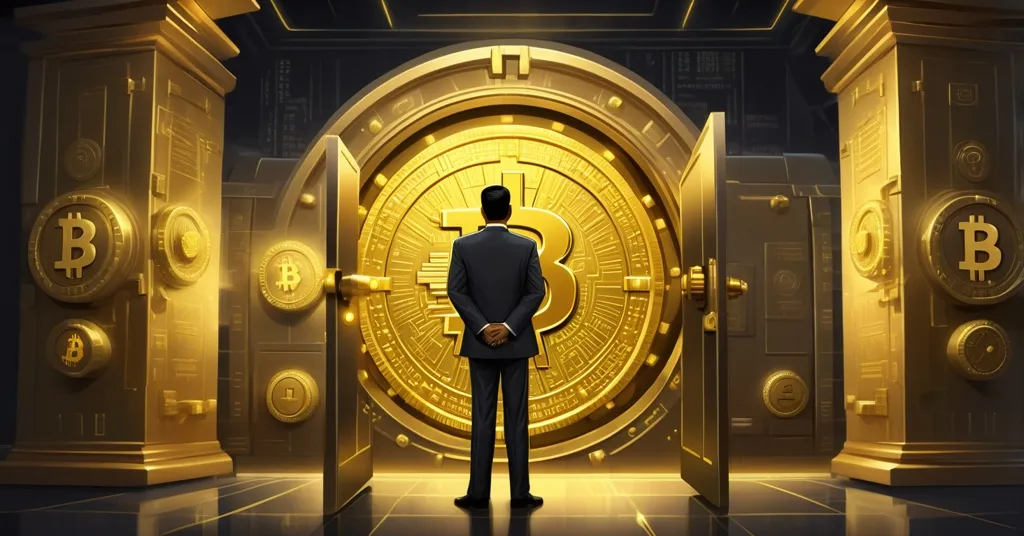Philippines’ Bold 10,000 Bitcoin Reserve Plan: Financial Genius or Risky Gamble?

Philippines’ 10,000 Bitcoin Reserve Plan: Bold Strategy or Reckless Bet?
The Philippines is stepping into uncharted territory with a daring proposal to amass 10,000 Bitcoin (BTC) as a strategic national reserve, a move that could either cement its place as a crypto pioneer in Southeast Asia or backfire spectacularly. Spearheaded by Congressman Miguel Luis Villafuerte through House Bill No. 421, the Strategic Bitcoin Reserve Act seeks to diversify the nation’s financial arsenal amid a crushing $285 billion national debt, while joining a global race to secure digital assets.
- Core Plan: Acquire 10,000 BTC over five years, managed by Bangko Sentral ng Pilipinas (BSP), locked for 20 years.
- Purpose: Diversify reserves and tackle sovereign debt under strict liquidation rules.
- Global Race: Governments hold 2.29% of Bitcoin’s supply, with the Philippines aiming to join top players.
The Plan: What House Bill No. 421 Entails
At its core, House Bill No. 421 is a calculated gamble to position Bitcoin as a national asset for the Philippines. The legislation directs the BSP, the country’s central bank, to purchase 2,000 BTC each year for five years, totaling 10,000 BTC—a stash that could be worth over $1 billion at today’s prices. These coins will be secured in cold storage, which, for the uninitiated, means offline wallets or hardware devices that keep digital assets safe from hackers, akin to locking gold in a fortified vault. But here’s the kicker: this reserve is untouchable for at least 20 years, a time-locked safe of sorts. Post-lock, liquidation is capped at 10% every two years, and only to retire sovereign debt, a pressing issue with the nation owing ₱16.09 trillion ($285 billion) as of November 2024, with 68% of that burden domestic.
Congressman Villafuerte, the driving force behind this House Bill No. 421 proposal, sees Bitcoin as a lifeline for financial stability. He’s banking on its historical 40% annualized growth over the past five years as evidence of its staying power.
“It is vital that the country stockpile strategic assets such as Bitcoin to provide financial stability and safeguard our national interest.”
His reasoning resonates with a growing sentiment that Bitcoin isn’t just a speculative fad but a geopolitical tool. He even cites Russian President Vladimir Putin’s blunt take on the cryptocurrency as “unstoppable,” a nod to how nations under sanctions are turning to digital assets for trade. For context, sanctions are trade and financial restrictions imposed by other countries, often forcing nations to seek alternatives like Bitcoin to bypass traditional banking systems. But before we get swept up in the optimism, let’s unpack whether this is a masterstroke or a potential disaster waiting to happen.
Local Context: Crypto Culture Meets Economic Need
The Philippines isn’t jumping into Bitcoin blindfolded. With a national debt that could choke any economy, the idea of using a high-growth asset to chip away at obligations makes sense on paper. The peso’s volatility and reliance on foreign reserves like the U.S. dollar further justify diversification into something like Bitcoin, which operates outside centralized control. Think of it as hedging your bets—when traditional systems wobble, a decentralized asset might just be the ace up your sleeve. But tying debt relief to something as unpredictable as Bitcoin? Some economists might call that betting the farm on a coin toss, as discussed in various analyses of risks and benefits.
Beyond economics, the Filipino public is primed for this. Ranking 7th globally in crypto adoption and 3rd regionally in trading volume per Chainalysis’ 2024 Geography of Crypto report, the Philippines has a vibrant grassroots crypto scene. From remittances sent via blockchain to play-to-earn gaming fueling household incomes, Filipinos are already living the digital currency life, contributing to the nation’s strong crypto adoption trends. Yet, while the streets buzz with Bitcoin enthusiasm, the government plays both cheerleader and referee. The Securities and Exchange Commission (SEC) recently targeted unlicensed exchanges like OKX, KuCoin, Kraken, and Bybit, slamming them as a “significant risk” to investors.
“Significant risk.”
This hardline stance shows a clear tension: the state wants Bitcoin’s benefits but dreads the Wild West chaos of unregulated markets. Add to that the BSP’s recent completion of Project Agila, a wholesale Central Bank Digital Currency (CBDC) trial, and you’ve got a nation hedging between Bitcoin’s untamed freedom and a state-controlled digital peso. Which path will win out?
Global Bitcoin Reserve Race: Where Does the Philippines Stand?
Zooming out, the Philippines isn’t some lone wolf in this Bitcoin hoarding game. Governments worldwide hold 480,196 BTC—roughly 2.29% of the total supply—worth a staggering $55.6 billion as of August 2025, according to global Bitcoin holdings data. The U.S. dominates with 198,022 BTC ($22.9 billion), mostly seized from criminal busts, followed by China at 190,000 BTC ($22 billion) and the U.K. with 61,245 BTC ($7 billion). Smaller but scrappy players include El Salvador, a trailblazer since making Bitcoin legal tender in 2021, with 6,268 BTC valued at $725 million, and Bhutan, holding 10,769 BTC through state-run mining. If the Philippines grabs its 10,000 BTC, it’ll outpace El Salvador and cozy up to Bhutan’s league, a bold statement for a Southeast Asian nation.
This global sprint is fueled by Bitcoin’s scarcity. With a hard cap of 21 million coins and over 20 million already mined, getting in early could be like staking claim to rare gold deposits before the rush. Nations from Hong Kong to Brazil—where a $19 billion Bitcoin reserve bill is under debate—to inflation-ravaged Argentina and Venezuela are eyeing similar moves. So, is the Philippines ready to slug it out in the big leagues, or is this a David-versus-Goliath mismatch? One thing’s clear: Southeast Asia could become a crypto reserve hotspot if neighbors like Thailand or Malaysia catch the bug, as highlighted in discussions on community platforms.
Risks and Roadblocks: It’s Not All Sunshine and HODL
Let’s cut the hype and talk straight. Bitcoin’s volatility is a beast—prices can skyrocket one day and crater the next. A 20-year lock sounds genius if BTC hits $1 million, but what if we’re mired in a decade-long bear market? The bill’s restrictions on selling aim to prevent panic dumps, but they don’t erase the gamble. And managing 10,000 BTC isn’t a game of Candy Crush—hackers are salivating at the thought of a glitchy vault. Cybersecurity is a massive hurdle, especially in a country still beefing up its digital defenses. Look at the U.S.—even with top-tier protocols, seized crypto has faced breaches. The BSP will need bulletproof systems, likely involving multi-signature wallets (where multiple keys are needed to access funds) and geographically dispersed storage, to avoid a catastrophic headline, a concern echoed in reports on the proposed reserve.
Then there’s the philosophical clash. Bitcoin was born as a middle finger to centralized control, championing freedom and privacy. So, when a government like the BSP hoards it, does it lose that rebel soul? Some in the crypto community might see this as betrayal, a dilution of what makes Bitcoin special. On the flip side, sovereign adoption could legitimize it further, driving mass acceptance. It’s a tightrope walk—can a decentralized dream survive under bureaucratic hands? Insights into such strategic considerations for Bitcoin are widely debated.
Public sentiment adds another layer. Filipinos are crypto-savvy, but will they cheer this as visionary or scoff at it as a reckless bet with taxpayer funds? Picture explaining to a struggling family why a volatile digital coin is worth prioritizing over immediate needs like healthcare or roads. Education will be crucial to bridge that gap, and the government better have a damn good pitch, especially considering the broader context of cryptocurrency legality across nations.
What’s Next for the Philippines?
This Bitcoin reserve plan places the Philippines at a pivotal crossroads. If House Bill No. 421 passes and is executed flawlessly, it could inspire a domino effect across Southeast Asia, proving Bitcoin’s worth as a sovereign asset. But if mismanagement or market crashes derail it, we’re looking at a cautionary tale for others daring to dream big. Keep an eye on the legislative debates, BSP’s implementation strategy, and public reaction—these will shape whether this is a historic leap or a painful faceplant. One block at a time, we’re witnessing a nation wrestle with the future of money.
Key Takeaways and Questions
- What is the Strategic Bitcoin Reserve Act in the Philippines?
It’s House Bill No. 421, a proposal to buy 10,000 BTC over five years as a national reserve, locked for 20 years, primarily to address sovereign debt under tight restrictions, managed by the BSP. - Why is the Philippines pursuing a Bitcoin reserve?
To diversify beyond traditional assets like gold and the U.S. dollar, seeking financial stability and aligning with a global trend of nations viewing Bitcoin as a strategic hedge. - How much Bitcoin do governments currently hold?
Roughly 480,196 BTC, or 2.29% of total supply, valued at $55.6 billion, led by the U.S., China, and the U.K., with smaller nations like El Salvador also in the mix. - What’s the state of crypto adoption in the Philippines?
It’s booming—ranked 7th globally, driven by remittances and gaming, though regulators are tightening the reins on unlicensed platforms to balance innovation and safety. - What are the major risks of this Bitcoin reserve plan?
Bitcoin’s wild price swings, cybersecurity threats to cold storage, and the 20-year lock period could spell trouble if markets tank or systems fail, despite built-in safeguards. - How does this fit into the worldwide push for Bitcoin?
It’s part of a broader wave where countries like El Salvador, Brazil, and Russia are integrating Bitcoin into national strategies, racing to secure a slice of its limited supply.



